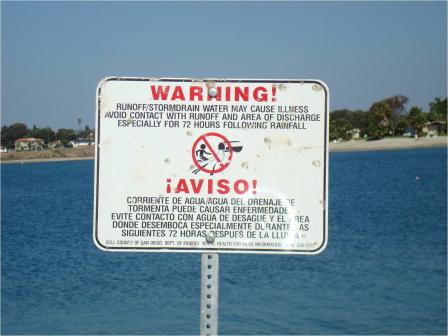LEARN: Human Health at the Beach
Swimming at beaches with pollution in the water or in the sand can make you ill. EPA supports local and state efforts to protect and clean up beaches. EPA also supports monitoring and notification efforts by local beach programs. In the event that beaches are closed or advisories are posted, it is most often because water samples for certain bacteria indicate that harmful bacteria, viruses, protozoa, or parasites are likely present in the waters.
Polluted runoff and untreated sewage released into the water can expose swimmers to harmful microorganisms called “pathogens.” These pathogens can be present at or near the site where polluted discharges enter the water. Pollution can also come from high concentrations of farm animals like pigs and chickens that can contaminate local waterways with runoff, which is then carried to beaches and swimming areas. In addition, pollution is created by people who leave trash or animal wastes at beaches.
Beach Related Illnesses

Children, the elderly and people with weakened immune systems are the most likely populations to develop illnesses or infections after coming into contact with polluted water, usually while swimming. Fortunately, while swimming-related illnesses are unpleasant, they are usually not very serious - they require little or no treatment or get better quickly upon treatment, and they have no long-term health effects.
The most common illness associated with swimming in water polluted by sewage is gastroenteritis. It occurs in a variety of forms that can have one or more of the following symptoms: nausea, vomiting, stomachache, diarrhea, headache or fever. Other minor illnesses associated with swimming include ear, eye, nose and throat infections. In highly polluted water, swimmers may occasionally be exposed to more serious diseases.
Not all illnesses from a day at the beach are from swimming. Food poisoning from improperly refrigerated picnic lunches may also have some of the same symptoms as swimming-related illnesses, including stomachache, nausea, vomiting and diarrhea.
Beach Safety

Observe any beach closure, advisory, or safety hazards signs. In areas that are not monitored regularly, choose swimming sites in less developed areas with good water circulation, such as beaches at the ocean. Avoid swimming at beaches where you can see discharge pipes or at urban beaches after a heavy rainfall.
Most swimmers are exposed to waterborne pathogens when they swallow the water. People can get some infections simply from getting polluted water on their skin or in their eyes. In rare cases, swimmers can develop illnesses or infections if an open wound is exposed to polluted water. You will be less likely to get sick if you wade or swim without putting your head under water.
Recent research in epidemiology
EPA has also linked digging in beach sand to an increased risk of gastrointestinal illness.
Monitoring Beach Waters
State, tribal, and local health and environmental protection agencies
Agencies across the county are responsible for monitoring the quality of water at coastal and Great Lakes region beaches and posting advisories or closing beaches when fecal indicator bacteria in the water are too high; however, some other areas have inadequate programs or no programs at all.
The Beach Advisory and Closing Online Notification system (BEACON)
BEACON is a source of longer-term data about beach water quality. EPA created BEACON to provide the Agency's requirement to provide to the public a database of pollution occurrences for coastal recreation waters. BEACON contains annual state-reported beach monitoring and notification data and is available online.
Other Beach Safety Topics
Beyond water pollution, there are other potential threats to human health at the beach to be aware of. The links below contain information on other sources of potential harm to your health at the beach.
The following links exit the site Exit
Avoid Harm from Sun Exposure
- Sunwise Program
This website explains simple steps to protect against overexposure to UV radiation as well as how to check the UV Index for your area. - UV Radiation (Centers for Disease Control and Prevention)
Information about risks of UV radiation. - UV Protection (The National Weather Service)
This website provides information on UV radiation exposure and current levels for your area.
Practice Healthy Swimming
-
Healthy Swimming (Centers for Disease Control and Prevention)
This program provides information for the public and health professionals (for example, outbreak response toolkits and the Model Aquatic Health Code) on a variety of subjects.
Avoid Heat Related Illnesses
-
Extreme Heat (Centers for Disease Control and Prevention)
This website provides information on how to prevent heat related illness at the beach.
Avoid Severe Weather
-
The National Weather Service
This website provides information on any possible severe weather conditions in your area.
